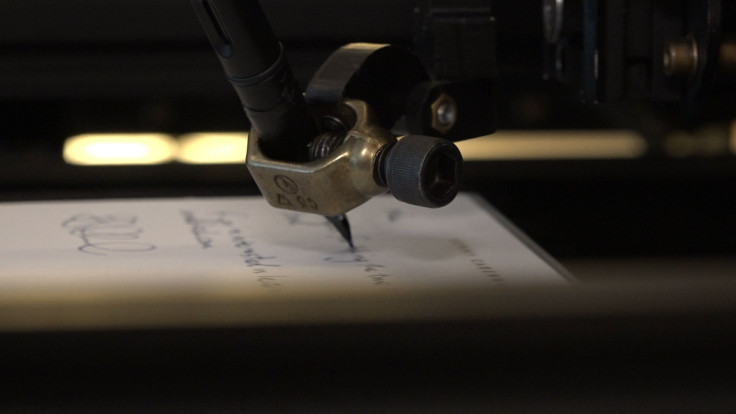Handwriting Robot Can Send Christmas Cards Using Nikola Tesla's Style [VIDEO]

Getting a Christmas card is wonderful, but actually writing them out is a pain. Bond, a New York City startup, promises a solution. The company takes samples of a customer's handwriting and feeds it into a machine that mimics the original. CEO Sonny Caberwal is excited about the prospect of consumers using the service to send Christmas cards, but the possibilities are more wide-ranging.
Bond can create handwritten notes from famous people, and promos for it name Nikola Tesla as an example. The service can even capture a child's handwriting through the stages of development, or preserve the handwriting of a person with Alzheimer's disease. The prospect of handing over a person's writings and storing them in a system, however, raises questions about personal data protection, and even whether using the service is ethical.
Caberwal dismisses the idea that a Bond card is somehow less authentic than a traditional card. "Whether you used this service or not to actually deliver the product, we think what's important is the words and content, the appreciation itself," he said. Nonetheless, Bond has plans to include the company logo on outgoing stationary to clarify a note's origin.
The company allows people to send cards they might not otherwise have had time to write. Bond Black, a new mobile app that launched Dec. 10, promises to streamline the process. Customers can compose and send notes in their own handwriting all from their mobile devices. A user can send a thank-you note straight after a dinner or write a response to a letter even while away from a desk.
"We're really inspired by products that help people be better versions of themselves," Caberwal said. He cites Playdate, which provides recipes for parents and kids to try out, as an example of a company with a similar aim.
All of this technology doesn't come cheap. Recording a handwriting sample costs $500, with greeting cards starting at $3 per recipient. For someone with a lot of contacts to write to, it adds up quickly.
The prospect of an automated, streamlined handwriting service is sure to appeal to those who don't have the time to write out so many cards. When handing over any personal information, however, there's always a risk the data could fall into the wrong hands. With something as personal as handwriting, a data breach could have severe consequences.
Evan Greer, campaign director at internet freedom and privacy group Fight for the Future, said legislation does not protect consumers as much as it could. That means it's more important than ever to stay vigilant when handing out important personal information.
"Any time that we hand over any type of personal information to a third party, we need more mechanisms to hold these types of companies accountable, and make sure they're doing everything in their power to protect that kind of data," she said.
Caberwal said there was no likely chance of hackers using someone's handwriting for their own means. He claims it's "far simpler" to forge a signature from a credit card receipt than it is to hijack the company's proprietary machinery. The company's website uses SHA2 encryption certificates, which in layman's terms means the connection is secure.
Bond's technology may revive an arguably lost art form and bring it into the 21st century.
© Copyright IBTimes 2024. All rights reserved.












